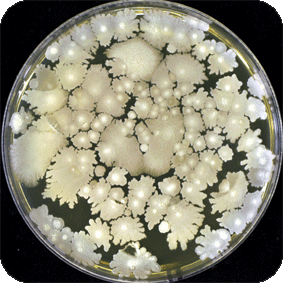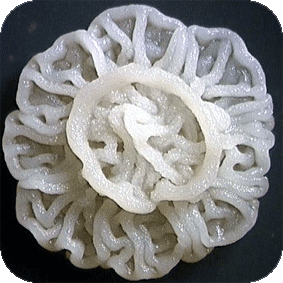Research Groups at the Department of Genetics and Microbiology
The Laboratory of Virology (led by Sandra Huerfano Meneses, Ph.D.) focuses primarily on small DNA viruses from the families Polyomaviridae and Hepadnaviridae. Members of the Laboratory study interactions between viruses and their products with various host cell structures, as well as the functional consequences of these interactions. They also explore the use of viral capsids and pseudocapsids in gene therapy and/or the delivery of biologically active substances into mammalian cells.
 The Laboratory of Molecular and Tumour Virology (led by Assoc. Prof. Ruth Tachezy, Ph.D.) investigates small non-enveloped DNA viruses associated with human cancer. In addition to studying human papillomaviruses, the group examines human polyomaviruses and other small DNA viruses (anelloviruses, human bocavirus). This team has also developed various approaches to characterize the viral etiology of tumors.
The Laboratory of Molecular and Tumour Virology (led by Assoc. Prof. Ruth Tachezy, Ph.D.) investigates small non-enveloped DNA viruses associated with human cancer. In addition to studying human papillomaviruses, the group examines human polyomaviruses and other small DNA viruses (anelloviruses, human bocavirus). This team has also developed various approaches to characterize the viral etiology of tumors.
 The Laboratory of Immunotherapy (led by Michal Šmahel. Ph.D.) is focused on cancer immunotherapy induced by human viruses. Experimental research on immunotherapeutic approaches is conducted using mouse models of tumors caused by human papillomaviruses. DNA vaccines targeting tumor antigens and antigens on cells supporting tumor growth are being developed. Activation of adaptive immunity via DNA vaccination is combined with activation of innate immune cells and suppression of immunosuppressive mechanisms that inhibit anti-tumor immunity. The group also studies reduced MHC class I molecule production on tumor cells and the preparation of corresponding mouse models. Additionally, mouse and human tumor properties are analyzed in the context of immunotherapy.
The Laboratory of Immunotherapy (led by Michal Šmahel. Ph.D.) is focused on cancer immunotherapy induced by human viruses. Experimental research on immunotherapeutic approaches is conducted using mouse models of tumors caused by human papillomaviruses. DNA vaccines targeting tumor antigens and antigens on cells supporting tumor growth are being developed. Activation of adaptive immunity via DNA vaccination is combined with activation of innate immune cells and suppression of immunosuppressive mechanisms that inhibit anti-tumor immunity. The group also studies reduced MHC class I molecule production on tumor cells and the preparation of corresponding mouse models. Additionally, mouse and human tumor properties are analyzed in the context of immunotherapy.
 The Laboratory of Proteases (led by Klára Grantz Šašková, Ph.D.) is the second newest research group in the Department (established in 2016, originally based at the Institute of Organic Chemistry and Biochemistry of the CAS). It focuses on the role of DDI1-like family proteins in DNA repair and transcription regulation. Members also study the biology of hepatitis B virus and work on developing new strategies for degrading the virus's cccDNA (a molecule found in the nuclei of infected liver cells that serves as a transcriptional template for HBV). The part of this group led by Assoc. Prof. RNDr. Ivan Hirsch, Ph.D., investigates the role of innate immunity in the elimination of HBV genome from infected cell nuclei and is also engaged in the long-term study of HIV reservoir eradication resistant to combined therapy.
The Laboratory of Proteases (led by Klára Grantz Šašková, Ph.D.) is the second newest research group in the Department (established in 2016, originally based at the Institute of Organic Chemistry and Biochemistry of the CAS). It focuses on the role of DDI1-like family proteins in DNA repair and transcription regulation. Members also study the biology of hepatitis B virus and work on developing new strategies for degrading the virus's cccDNA (a molecule found in the nuclei of infected liver cells that serves as a transcriptional template for HBV). The part of this group led by Assoc. Prof. RNDr. Ivan Hirsch, Ph.D., investigates the role of innate immunity in the elimination of HBV genome from infected cell nuclei and is also engaged in the long-term study of HIV reservoir eradication resistant to combined therapy.
 The Laboratory of Bacterial Physiology (led by Assoc. Prof. Radovan Fišer, Ph.D.) explores bacterial toxins that affect the cytoplasmic membrane of target cells. It also investigates bacterial membrane adaptation to stress, interactions with surfactants, and bacterial cell interactions with nanomaterials. The group employs a diverse range of biophysical methods, including fluorescence spectroscopy and microscopy, conductivity measurements on lipid bilayers, X-ray structural analysis, analytical chemistry methods (gas and liquid chromatography), and computational methods for protein structure determination.
The Laboratory of Bacterial Physiology (led by Assoc. Prof. Radovan Fišer, Ph.D.) explores bacterial toxins that affect the cytoplasmic membrane of target cells. It also investigates bacterial membrane adaptation to stress, interactions with surfactants, and bacterial cell interactions with nanomaterials. The group employs a diverse range of biophysical methods, including fluorescence spectroscopy and microscopy, conductivity measurements on lipid bilayers, X-ray structural analysis, analytical chemistry methods (gas and liquid chromatography), and computational methods for protein structure determination.
 The Laboratory of Bacterial Genetics (led by Jaroslav Nunvář, Ph.D.) focuses on comparative genomics of prokaryotes. The primary study subjects are repetitive extragenic sequences in bacterial genomes (REP and YPAL elements): their distribution, variability, evolutionary plasticity, and association with transposable elements. Comparative-genomic analysis outputs are further used to detect mechanisms of genetic adaptation in bacterial pathogens during chronic infections of human hosts.
The Laboratory of Bacterial Genetics (led by Jaroslav Nunvář, Ph.D.) focuses on comparative genomics of prokaryotes. The primary study subjects are repetitive extragenic sequences in bacterial genomes (REP and YPAL elements): their distribution, variability, evolutionary plasticity, and association with transposable elements. Comparative-genomic analysis outputs are further used to detect mechanisms of genetic adaptation in bacterial pathogens during chronic infections of human hosts.
 The Laboratory of Regulatory RNAs (led by Jarmila Hnilicová, Ph.D.), the newest group in the Department (established in 2023, originally based at the Institute of Microbiology of the CAS), studies small non-coding RNAs that regulate bacterial transcription. They focus primarily on RNAs binding to RNA polymerase, which are sought using RIP-seq methods across various bacteria. The long-term goal of this research group is to understand how these RNAs function and to explore their potential future use in developing specific RNA antibiotics targeting individual bacterial species.
The Laboratory of Regulatory RNAs (led by Jarmila Hnilicová, Ph.D.), the newest group in the Department (established in 2023, originally based at the Institute of Microbiology of the CAS), studies small non-coding RNAs that regulate bacterial transcription. They focus primarily on RNAs binding to RNA polymerase, which are sought using RIP-seq methods across various bacteria. The long-term goal of this research group is to understand how these RNAs function and to explore their potential future use in developing specific RNA antibiotics targeting individual bacterial species.
 The Laboratory of RNA Biochemistry team (led by Martin Pospíšek, Ph.D.) investigates fundamental principles of protein synthesis in eukaryotic cells. The aim is to uncover the interplay between viruses and cellular antiviral defenses using selected models, and to apply insights from basic research to understand the development of certain diseases, particularly some cancers. The primary models used by the Laboratory are human cell lines, variants of hepatitis C virus, and the single-celled eukaryotic model organism, the yeast Saccharomyces cerevisiae.
The Laboratory of RNA Biochemistry team (led by Martin Pospíšek, Ph.D.) investigates fundamental principles of protein synthesis in eukaryotic cells. The aim is to uncover the interplay between viruses and cellular antiviral defenses using selected models, and to apply insights from basic research to understand the development of certain diseases, particularly some cancers. The primary models used by the Laboratory are human cell lines, variants of hepatitis C virus, and the single-celled eukaryotic model organism, the yeast Saccharomyces cerevisiae.
 The main research topics of the Laboratory of Biology of Yeast Colonies (led by Prof. Zdena Palková, Ph.D.) include molecular aspects of development and extracellular signaling in yeast colonies as a model for multicellular organized structures. Two key research directions are the study of differences in colony formation mechanisms under natural versus laboratory conditions, the role of ammonia as a signaling molecule in long-term colony survival, and the study of both horizontal and vertical differentiation of colony cells, with some differentiation parameters related to survival or programmed cell death in specific areas.
The main research topics of the Laboratory of Biology of Yeast Colonies (led by Prof. Zdena Palková, Ph.D.) include molecular aspects of development and extracellular signaling in yeast colonies as a model for multicellular organized structures. Two key research directions are the study of differences in colony formation mechanisms under natural versus laboratory conditions, the role of ammonia as a signaling molecule in long-term colony survival, and the study of both horizontal and vertical differentiation of colony cells, with some differentiation parameters related to survival or programmed cell death in specific areas.
 The Laboratory of Plant Genetics (led by Assoc. Prof. Dana Holá, Ph.D.) focuses on the research of intraspecific variability in various functional and structural characteristics of crop plants, particularly regarding potential causes of heterosis. Current research includes the study of the causes of different resistance of inbred and hybrid genotypes to various abiotic stress factors, the phenomenon of stress memory in plants, and the effects of steroid compounds on plant organism, in relation to both stress and their potential effects on the photosynthetic apparatus.
The Laboratory of Plant Genetics (led by Assoc. Prof. Dana Holá, Ph.D.) focuses on the research of intraspecific variability in various functional and structural characteristics of crop plants, particularly regarding potential causes of heterosis. Current research includes the study of the causes of different resistance of inbred and hybrid genotypes to various abiotic stress factors, the phenomenon of stress memory in plants, and the effects of steroid compounds on plant organism, in relation to both stress and their potential effects on the photosynthetic apparatus.
 The Laboratory of Arachnid Cytogenetics (led by Assoc. Prof. Jiří Král, Ph.D.) is the only research group worldwide specializing in chromosomal analyses of this group of arthropods, which is an excellent model for studying sex chromosomes or holocentric chromosomes, achiasmatic meiosis, or animal genome polyploidization, as well as karyotype modifications associated with various modes of parthenogenesis.
The Laboratory of Arachnid Cytogenetics (led by Assoc. Prof. Jiří Král, Ph.D.) is the only research group worldwide specializing in chromosomal analyses of this group of arthropods, which is an excellent model for studying sex chromosomes or holocentric chromosomes, achiasmatic meiosis, or animal genome polyploidization, as well as karyotype modifications associated with various modes of parthenogenesis.





















